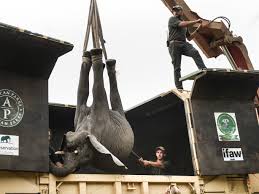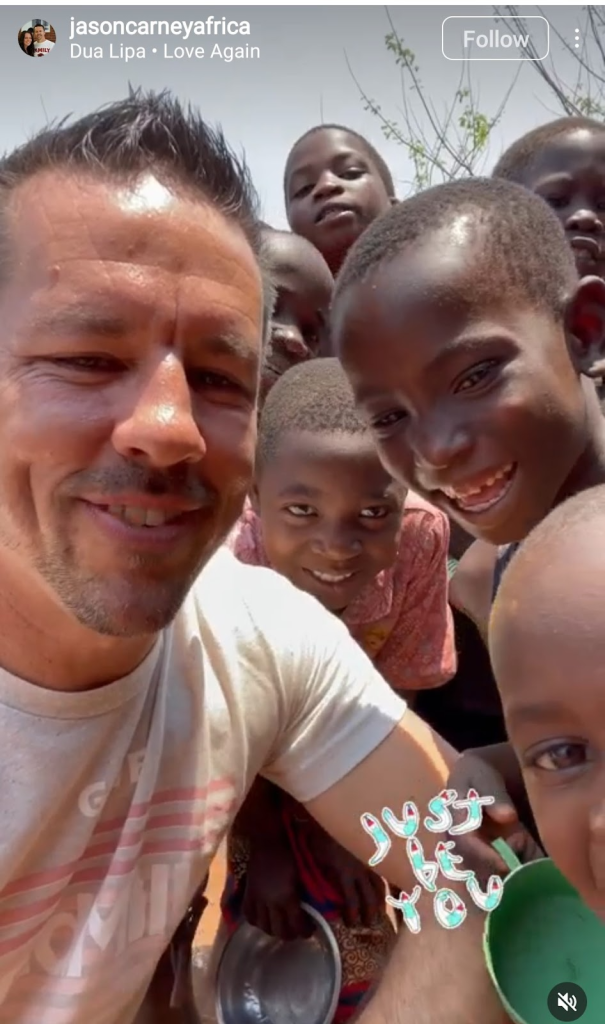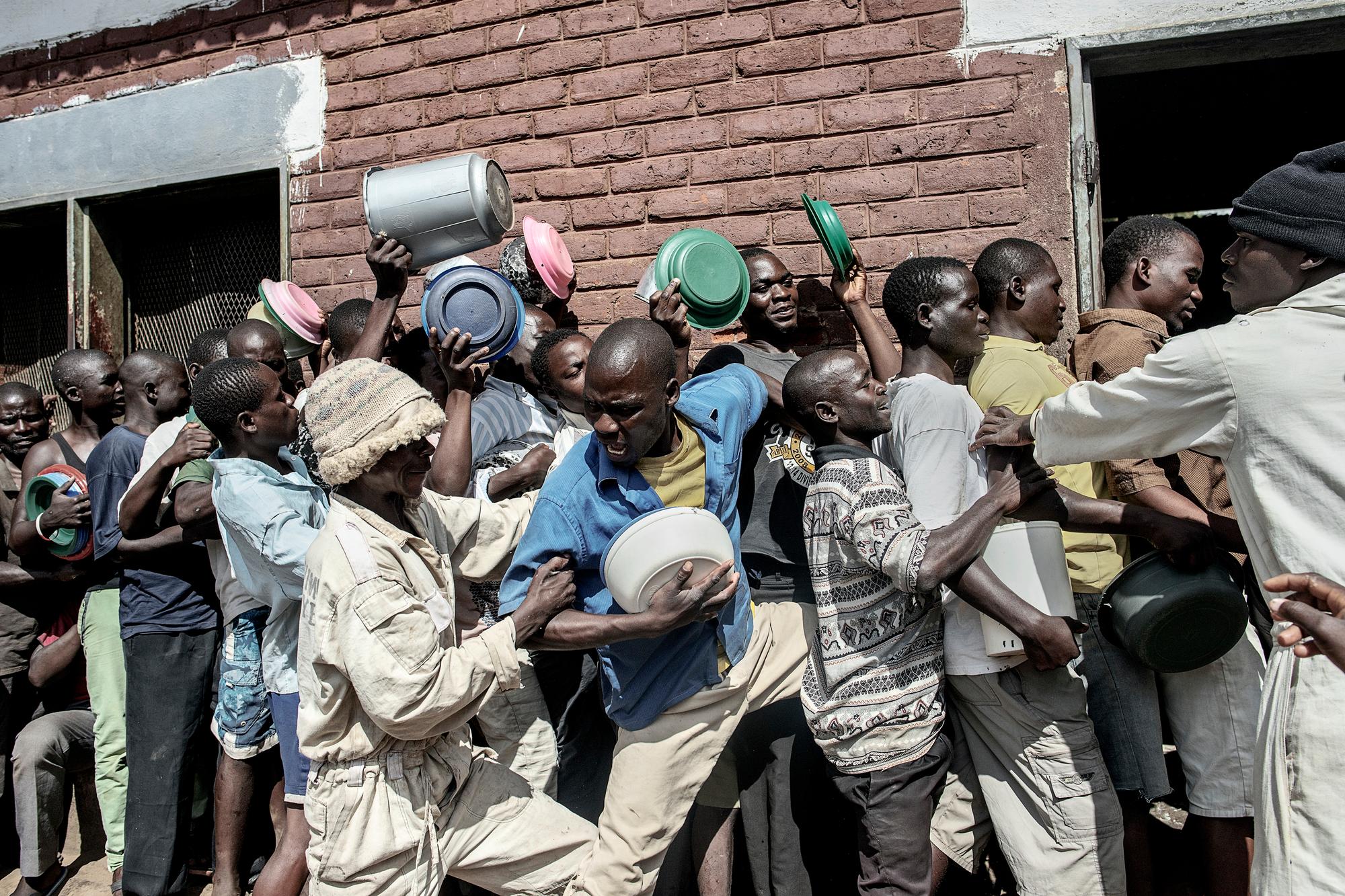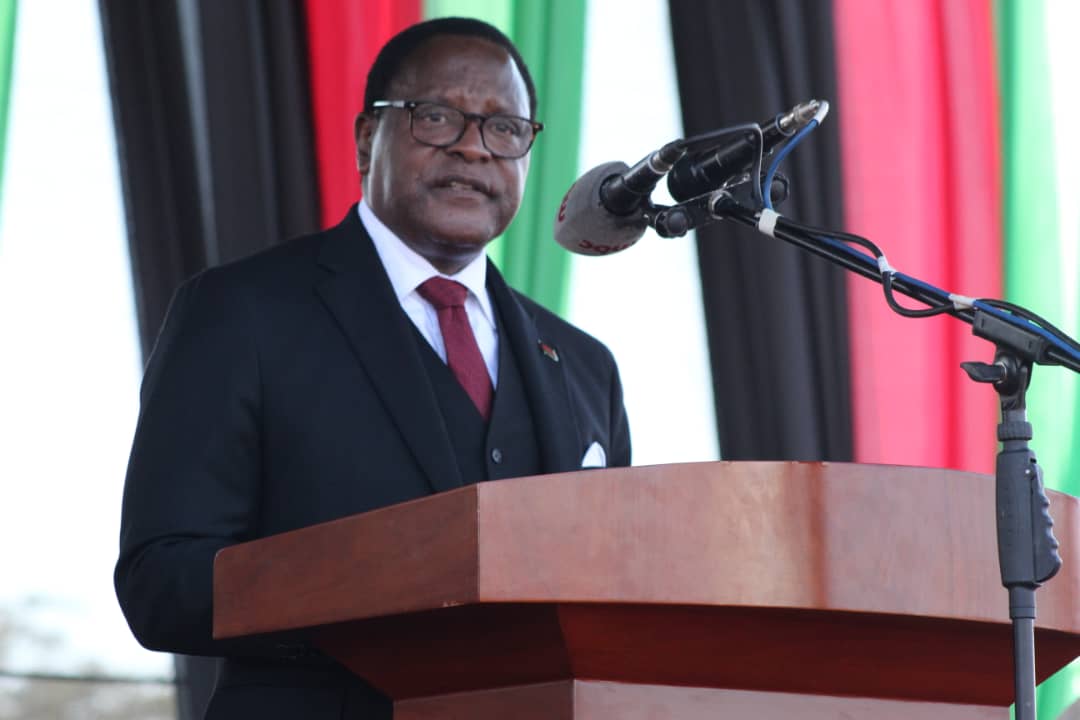BY JACK McBRAMS When the world toasted the historic translocation of 263 elephants and 431 other wild animals from Malawi’s Liwonde National Park to Kasungu National Park in mid-2022, especially with British royalty, Prince Harry, lending his presence, it was hailed as a glittering conservation success. High-definition drone footage swept across verdant plains. Conservationists in khaki grinned for the cameras. Press releases gushed about “biodiversity protection” and “coexistence with nature.” At the podiums stood the International Fund for Animal Welfare (IFAW) and African Parks, their fundraising videos saturated with emotional music and promises of a greener, shared future. But hundreds of miles away from gala dinners and donor conference rooms, in the sun-scorched villages that border Kasungu National Park, a very different legacy was unfolding — one written in blood, broken bodies, shattered livelihoods, and graves dug far too soon. For villagers like Kannock Phiri, whose wife Masiye Banda and infant daughter were killed in what officials call a “conservation conflict,” there was no celebration. Only silence. Only loss. Only the long, unrelenting shadow of decisions made by distant hands — choices that turned daily life into a brutal gamble for survival. The 2022 translocation of 263 elephants from Liwonde National Park to Kasungu National Park was hailed as historic A Disaster Foretold — and Ignored Internal documents, interviews, and confidential warnings obtained by the Platform for Investigative Journalism (PIJ) show that the catastrophe was not unforeseen — it was forewarned. As early as 2019, Mike Labuschange, then head of IFAW’s Malawi-Zambia Transboundary Landscape Project, had raised urgent alarms: Kasungu National Park was not ready. The electrified perimeter fence — essential to contain the elephants and protect the surrounding communities — was incomplete. Key sections were little more than strands of rusting wire strung through the bush. Without a proper barrier, Labuschagne predicted, the translocated elephants would inevitably escape into nearby villages, driven by hunger and confusion, smashing homes, destroying crops, and killing humans. But his warnings, he says, were brushed aside by executives eager for the "spectacle" of the world’s second-largest elephant translocation. “This wasn’t just incompetence; it was criminal negligence,” Labuschagne tells PIJ, his voice taut with restrained fury. “They knew. They were told. But the fundraising videos, the positive headlines — that was all they cared about." And so, in July 2022, with international cameras rolling and donors applauding, the elephants were trucked in, unloaded into an unprepared landscape — and a slow-motion disaster began. Kannock Phiri with three of his five children Michael (13), Enifa (12) and Praise (7). And on the right is miracle baby Beatrice, her leg cast in POP after the incident that claimed her mother When Dreams Died in the Maize Fields One sun-washed afternoon in February 2023, in Chafwamba Village, 25 kilometres from Kasungu on the dusty and bumpy trail that leads to the Zambian border, life irrevocably changed for Kannock Phiri. His wife, Masiye, carrying their one-year-old daughter Beatrice strapped snugly to her back, had set off toward their maize field to collect vegetables. It was a simple, ordinary act in a life built on hard work and humble dreams. She never came back. Hours later, Phiri’s world crumbled after fellow villagers informed him that they had found her body crumpled amid flattened maize stalks, blood and dust staining her once-bright chitenje. The elephant had struck without warning — trampling her underfoot, destroying not just a mother, but a whole future. Miraculously, baby Beatrice survived, hurled free when the chitenje tore loose. Her tiny leg was broken, her cries piercing the stunned afternoon air. The park officials arrived hours later, bearing a plain wooden coffin and a few bags of maize flour — a crude, hollow offering for a life erased. After the funeral, Phiri tells PIJ, they vanished. No counseling, no compensation, no justice. “I was left alone, with five children and a farm too large to manage alone,” he says quietly, his eyes hollow. “Every night, we wait, listening for elephants. Every night, we remember.” Chalilima gestures at the devastation caused by the elephant rampage the night before A Silent War in the Night Phiri’s story is far from unique. In T/A Chisinga and T/A Chulu and dozens of other villages strung along the invisible fault lines between the park and human settlements, life has turned into a nightly siege. Rodwell Chalilima, a wiry farmer with deep grooves etched into his weathered face, recounts one haunting night: “It was midnight. The dogs went wild. When I stepped outside, the moonlight was silver on their backs — a whole army of elephants, maybe two hundred of them, moving like a grey ocean.” He watched helplessly as the invaders flattened his fields. Maize, sweet potatoes, cassava — months of backbreaking labor — crushed to pulp in minutes. Before the elephants, Rodwell could harvest 250 bags of maize. Enough to feed his family. Enough to sell and send his children to school. Now? “Maybe 50 bags,” he says. “If we’re lucky." Families spend their nights crouched in single rooms, clutching their children and praying that the heavy, thudding footfalls will pass them by. But too often, they do not. Limbikani’s brother John was crushed to death by the elephants Blood in the Dust By September 2022, the toll was already horrifying. At least fourteen people dead — mothers, fathers, sons — trampled or gored by frightened, hungry elephants scavenging for food in the villages. Hundreds injured, some left with shattered limbs and permanent disabilities. Entire villages uprooted. Schools abandoned. Fields deserted. Children spoke of sleeping in trees, or in shallow hand-dug pits, too terrified to stay above ground after sunset. Brothers John and Limbikani Kayedzeka lived this nightmare too. John, a proud cassava farmer, was tending his field one morning when the elephants came. “They found him. They crushed him like he was nothing," says Limbikani, blinking back tears. John’s two sons, Nicholas and David, now live with their widowed mother, surviving on handouts and hope. “We plant crops,” says Limbikani. “But we know — any night, the elephants will come again.” A Humanitarian Crisis, Ignored According to the Warm Heart Initiative, the non-profit founded by Labuschagne after severing ties with IFAW, over 11,943 people have suffered direct harm — physical injury, psychological trauma, destruction of homes or fields. An economic analysis estimates over $4 million is needed to compensate affected households — a colossal figure in one of Malawi’s poorest districts. Yet, despite the devastation, IFAW and African Parks have offered no compensation, no apology, and no systematic plan to repair the damage. “It’s imperialism disguised as conservation,” Labuschange says bitterly. “They manage the landscape for their cameras, not for the people who actually live here. Real conservation should mean coexistence — not conquest." An IFAW poster advocating for the co-existence of elephants and people Conservation Groups Silent, Government Unresponsive When confronted with the mounting humanitarian disaster unfolding in the villages surrounding Kasungu National Park, the International Fund for Animal Welfare (IFAW) responded not with accountability, but with deflection and defensiveness. Rather than engaging seriously with the growing evidence of harm — deaths, injuries, ruined harvests — IFAW officials insisted on describing the translocation project as a “world-class conservation success story.” In a statement posted on their website, IFAW emphasized their technical role and dismissed concerns about human impact as inevitable risks inherent to any large-scale wildlife movement. “IFAW’s role was to support the Malawian government that runs the Kasungu NP. IFAW does not manage any national parks or decide on the actions taken. IFAW assists with financial means, as conservation advisors and with law-enforcement and community engagement capacity. IFAW operates in a supportive capacity rather than having management and ownership of the operation,” the statement reads. Privately, sources within IFAW revealed that protecting the organization’s international reputation and donor relationships had become the overriding priority once complaints from Kasungu villagers began surfacing. While IFAW has not responded to inquiry, an article published on Nyasa Times quotes the organization as accusing Labuschagne of harboring personal bitterness after his contract was not renewed, and of orchestrating a “smear campaign” to tarnish IFAW’s image. “IFAW has become the target of a malicious and false campaign spearheaded by Labuschagne following his dismissal from a project he was once involved in,” said IFAW President and CEO Azzedine Downes. “He later formed an organisation called Warm Heart, which he’s using to advance his vendetta.” He stressed that ultimate jurisdiction over Malawi’s national parks lies with the government through the Department of National Parks & Wildlife (DNPW), and that the Kasungu project falls under the Malawi-Zambia Transfrontier Conservation Area (TFCA) Treaty. “The western side of Kasungu National Park — which borders Zambia — is intentionally unfenced to preserve migratory routes,” Downes noted. “The elephant translocation was part of Malawi’s ongoing effort to restock and revitalize protected areas, and was supported by Zambia’s DNPW, with technical and financial backing from IFAW.” Despite a growing death toll and extensive damage to crops, the villagers say no senior government official has offered public condolences, initiated independent investigations, or announced any compensation measures. Locals claim complaints submitted to the Ministry of Tourism, Wildlife and Culture, as well as to local district authorities, were either ignored or redirected endlessly through bureaucratic channels. Villagers eagerly watch a truck arriving with the new elephants at Kasungu National Park in 2022 The Chief Speaks Kaston Nyirenda, Group Village Headman (GVH) for Mbuluunde, described the devastating toll in an emotional interview: “It’s a very sad story how our community has been affected by the elephants which cross the boundary from Kasungu National Park, terrorizing our crop fields. As a local leader, my expectation when I heard that the government is working on bringing new animals into the park was that they would first fix the park’s fence. But to our surprise, they only brought hyenas without fixing the fence. As a result, the hyenas have also been terrorizing our communities at night, catching livestock.” Nyirenda said it was only after the hyenas that the community learned elephants had also been introduced. “As I am talking, a lot of people, especially from T/A Chulu, have lost lives because of the elephants,” he said.“Last year, I lost my own auntie who was killed by the elephants. I also nearly lost my two children because the elephants demolished the house they were sleeping in at night.” Nyirenda criticized the government and conservation groups for prioritizing wildlife and tourism at the expense of human lives: “As the government promotes environmental conservation and tourism, they should also put at heart the importance of our lives. We have been reporting these issues for years, but no help has come.” He explained that even the new wire fence meant to control the elephants has caused further harm: “They didn’t even put the fence on the correct boundary. They took over our crop fields. We tried to reason with them, but it was futile. Now we are crying twice — our fields destroyed by elephants and our land taken away by the park.” Nyirenda described desperate suggestions to push the elephants deeper into the park — suggestions that were dismissed by officials who said the elephants would return anyway. In closing, Nyirenda stressed: “Yes, animals help the economy through tourism. But what about us, the people living with the consequences? Our lives are at risk. We are helpless.” Government Response: Promises, Programs, and Legal Caution In the wake of mounting local anger and international attention, the Malawi Ministry of Wildlife and Parks through its spokesperson, Joseph Nkosi, emphasized that the government is actively working to address the escalating human-wildlife conflict: “The government is currently engaged in the construction of a 135 km fence around Kasungu National Park, which is now 84% complete,” he said. “This fence construction initiative is participatory in nature. Local communities adjacent to the park are being trained in fence construction and compensated for their work. This approach fosters a sense of ownership, encouraging community members to protect the fence diligently. As a result, this initiative helps mitigate challenges related to human-wildlife conflict while at the same time improving food security.” Beyond the fencing project, Nkosi outlined several community interventions designed to reduce tensions and boost local livelihoods. However, for many villagers grappling with destroyed harvests, lost loved ones, and lingering fear, these programs have not provided immediate relief. When asked specifically about the impending lawsuit filed by villagers — represented by UK law firm Leigh Day — Nkosi confirmed that the government was aware but had yet to take formal action: “While we have not yet received the official lawsuit documentation, we were alerted to the matter by our embassy in the UK. Once we receive and review the documents, we will formally communicate our position. Please be assured that as a Ministry we are closely monitoring the issue.” On the thorny question of compensation for the victims, Nkosi offered a carefully worded response: “The legal framework is silent on compensation; as such, we offer assistance on a case-by-case basis.” Phiri: Our people’s blood has fed this conservation. The world must know Fighting Back with Hope — and Lawsuits With traditional appeals ignored, desperate villagers are now fighting back through the courts. A coalition of local leaders, backed by human rights organizations, is preparing legal action against IFAW, seeking damages for the deaths, injuries, and loss of livelihoods. "We will not be silenced," vows community leader James Phiri. "Our people’s blood has fed this conservation. The world must know." In Kasungu, the villages are scarred — by grief, by hunger, by terror — but not defeated. At sunset, the low golden light catches the ruins of once-proud homes, the shattered remains of a harvest. And somewhere in the gathering dark, the heavy thud of elephants moving through the fields still echoes — a reminder of promises broken, and lives forever altered.







.jpg)

